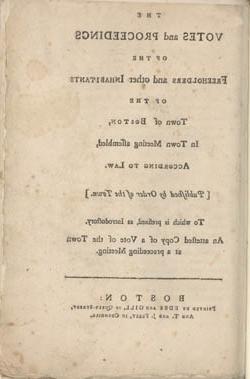The Votes and Proceedings of the Freeholders and other Inhabitants of the Town of Boston, in Town Meeting Assembled
To order an image, navigate to the full
display and click "request this image"
on the blue toolbar.
-
Choose an alternate description of this item written for these projects:
- Main description
[ This description is from the project: Coming of the American Revolution ]
In response to a town-wide petition, the recently formed Boston Committee of Correspondence prepared statements and lists of perceived infringements and violations of colonist's rights and collated them into this report, known as the "Boston Pamphlet".
The Boston Pamphlet
The Boston Committee of Correspondence holds its first meeting on 3 November 1772. While the committee's creation is sparked by concern over the payment of judicial salaries, the committee uses this issue as a springboard to revisit the larger issue of colonial rights. A subcommittee chaired by James Otis prepares a statement of the colonists' rights "as Men, as Christians, and as Subjects." Other committees create a list of perceived infringements and violations of those rights, as well as a letter of correspondence to the other towns in Massachusetts. Boston selectmen approve the documents at a town meeting on 20 November, and vote to collate them into a single pamphlet for distribution. Six hundred copies are published and delivered to each of the 260 towns and districts in Massachusetts, as well as to every Boston clergyman and selectmen. Once again, Bostonians make their voices heard throughout the colony and beyond, but will their arguments produce the desired effect?
Questions to Consider
1. The Boston Committee of Correspondence is established by a Boston town meeting on 2 November 1772 (page 3 in sequence). How many people will make up the committee? What is the committee's purpose?
2. According to the committee, what are the three natural rights of the colonists as men (page 6 in sequence)? In what other document(s) have you seen this same—or a similar—list of rights?
3. According to the committee, for what purpose was government instituted (page 10 in sequence)?
4. According to the committee, what are the rights of colonists as Christians (page 11 in sequence)? What Act does the committee cite as evidence?
5. According to the committee, what are the rights of the colonists as subjects (page 12 in sequence)? Why do they believe they are entitled to these rights?
6. Review the letter of correspondence to the other towns (page 34 in sequence). What exactly is the town of Boston asking other towns to do?
Further Exploration
7. Why would the Committee of Correspondence be certain to provide every clergyman with a copy of the pamphlet? Think about the role of religion and church attendance in colonial America.
8. The committee references several political thinkers throughout the pamphlet, including John Locke. Learn more about John Locke from your textbook or another reference source. Select one of the sections where Locke is cited and write a short paragraph explaining why the committee cited him there.
9. Review the list of men appointed to the committee of correspondence (page 3 in sequence). Do any of the names look familiar to you? Why? Identify at least one person on the list and write a short biographical sketch of that individual.

